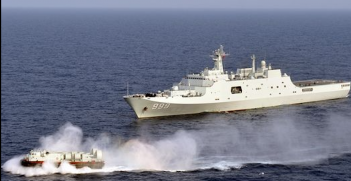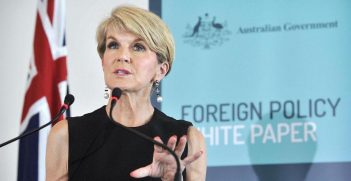Whose Rules? In Which Order?

Australia considers the stability of the current rules-based international order as a strategic interest. But defence of this order first requires Australia to determine which rules are worth fighting for and which ones can accommodate change. To date, no clear answer has emerged.
Australia’s recent defence of the rules-based international order is commendable, if a little erratic and nostalgic. The challenge to Australia’s vision of a rules-based order, mostly from China and Russia, means that a more concerted response is needed from like-minded middle powers in both Asia and Europe.
Aussie Rules
As an Asia-Pacific middle power, Australia is invested in promoting a rules-based international order. Like Europe, Australia relies on open, free access to markets and ideas for both its prosperity and security. So, it follows that Australia seeks an international order which is manageable and predictable, and one which suits our values as a Western liberal democracy.
But the recent Foreign Policy White Paper hinted at Australia’s growing anxieties over the current state and future direction of the international order. It referred to the importance of ‘rules’ or a ‘rules-based order’ no fewer than fifty times. Although the term and the general orientation towards multilateralism it infers have been the mainstays of Australian foreign policy since 1945, no other official government statement has placed the concept of a ‘rules-based international order’ at the forefront of Australian foreign policy in quite the same way.
For over 70 years, Australia’s order-building instincts were premised on three core foundations: continuing US military primacy and leadership in Asia; the maintenance of open and free markets; and the institutionalisation of democratic systems of government. In this way, the desired rules governing the ‘international’ order and the ‘regional’ order were the same. However, Australia looks out to an Asia-Pacific region today in which each of those foundational elements is under pressure, and in some cases, retreat.
Perhaps this is the reason for the Turnbull government’s more strident public defence of the ‘rules-based order’: it is just nostalgia wrapped up as strategy. But it fails to explain the repeated claim that the stability of the current order is one of Australia’s ‘core strategic interests’ and that the Australian Defence Force (ADF) should be prepared to fight to defend this order.
This elevates the entire issue of promoting a ‘rules-based order’ from one of diplomacy to war. It clearly breaks with the past practice of seeing the evolution of international order building as a developmental problem (“less Geneva, more Jakarta” indeed.) International order building through military force would be a very different world than the one we currently live in. And it would also seem to undermine the normative principles upon which the current order is built.
Having rattled the sword, the Foreign Policy White Paper then canvasses an alternative approach to order-building, one that would accommodate the rise of emerging powers and accept incremental changes to the existing institutional arrangements: “Australia believes the institutions that support global cooperation must accommodate the greater weight of emerging powers…Australia will therefore contribute constructively to the reform of international institutions.”
Challenges and responses
Australia’s vision of an international order based on rules and not power politics is most directly challenged by three recent events: China’s reclamation activities and militarisation of the South China Sea, the breakdown of the normative barriers to chemical weapons use; and the potential destabilising effects of a trade war between China and the United States.
In each case, Australia had a direct hand in the establishment of the ordering principles which are now threatened by others (read China and Russia). It matters to Australia if international agreements such as the UN Convention on the Law of the Sea, the Chemical Weapons Convention or the World Trade Organization are undermined.
To those three, we should add a fourth: the rapid evolution of cyber-enabled interference in the political, economic and social fabric of the West. Whereas the maritime, arms control and trade dimensions of geopolitics are well defined by rules and norms, the same is not true of the cyber domain. In the absence of rules, we should get ready to fight. The cyber domain, and the polarisation it causes between competing visions of how rules should apply in contemporary international relations, is emblematic of the problems faced by Australia and Europe in trying to defend, let alone improve, the rules-based order.
China and Russia challenge the contemporary rules-based international order in similar ways. But there are also important distinctions to be made between how Beijing and Moscow are seeking to influence and shape the ‘post-polar’ world. China is a reluctant and selective participant in the rules-based order. Although it has never reached the status of the ‘responsible stakeholder’ that many had hoped it would become, nor has it abandoned the rule book altogether. Throughout the current tit-for-tat trade dispute with the White House, China has managed to position itself as the sole defender of the WTO rules: a remarkable position only the current Trump administration could achieve.
Such is the challenge posed by countries such as Russia and China, that Australia and other regional powers are contemplating the use of all instruments of national power to defend the current international order. But, short of war, how should Australia and other like-minded countries approach the challenges to the rules based international order?
We should start from first principles: at the heart of Australian foreign policy there has always been a bias towards what the academic JDB Miller once described as a ‘dogged, low-gear idealism’. Australia faces the world with a mix of pragmatism and principle, calibrating responses to international problems with a strong emphasis on coalition-building with like-minded countries.
If the EU and Australia were looking to build a joint response to the problem of contemporary order building, initiatives such as the MIKTA grouping offer a glimpse of how this might be achieved. MIKTA is an informal meeting of foreign ministers from five middle powers (Mexico, Indonesia, South Korea, Turkey and Australia) which first met in the margins of the 2013 UN General Assembly and met again in Argentina this week. A similar mechanism established between middle powers in Europe and Asia, or an expanded MIKTA process, would offer a potentially useful mechanism to ‘build consensus’ on a rules-based international order.
The rules of the new international order will not be determined by the actions of the major powers alone. The diffusion of power and prosperity across the world will mean that the second-tier states will hold increasingly strategic positions, making them capable of shaping the politics, economics and security of their regions.
Dr Carl Ungerer is a former adviser to Minister for Foreign Affairs the Hon Bob Carr and former head of the Leadership, Crisis and Conflict Management Program at the Geneva Centre for Security Policy.
This article is an edited version of a background paper prepared for the EU-Australia Leadership Forum Sectoral Policy Workshop on the Rules-Based International Order that took place on 26-7 April in Brussels. Quentin Peel and Carl Ungerer were co-chairs of this dialogue. The AIIA is part of the international consortium delivering this project.





